

Two principal aspects can be distinguished in the GIS activity of the Geological Institute of Hungary. First of all, it is responsible for providing services for other departments of the Institute and the Hungarian Geological Survey. This objective is achieved by processing data of geological mapping projects in GIS. Priority is given to the establishment of GIS databases through digital acquisition of geological information available throughout the country, their processing and analysis facilitating computer-assisted output of thematic base- and derived maps on the scale and from the area required by the customers of the Institute. One of the main aspects of their GIS activity is to elaborate standard procedures for map processing and uniform legends enabling a broad range of customers to use and interpret their products. The main advantage of standard procedures is that thematic maps of any part of the country have consistent legends.
Throughout the recent years the environmental aspect of geosciences gained much importance. Following this trend, the Geological Institute of Hungary has been putting great emphasis on GIS processing of its large amount of data for addressing environmental issues. They include land use management, deposition of communal, industrial, agricultural and radioactive wastes, assessment of local and regional water supplies, assessment of the effects of industrial and agricultural activity and large constructions on the environment, monitoring the regime and quality of ground- and deep, subsurface water aquifers. These are some of the major environmental problems that cannot be addressed and reliably solved without the database and the professional knowledge of experts of the Geological Institute. Related base data is available in its data archive, whereas GIS technology provides the indispensable tool for experts to integrate them into a topologically structured multidisciplinary database. Its sophisticated analysis results in producing specific, derived maps for decision making.
Apart from providing services for mapping projects, the GIS group of the Geological Institute puts an ever-growing effort in realising projects on contractual basis. It is the second, but increasingly important aspect of its activity. Major customers include the Ministry for Environment and Regional Policy, the Paks Nuclear Power Plant and municipal authorities. The Institute's most recent project was aimed at setting up the digital geoscientific database of the surroundings of the Paks Nuclear Power Plant and selecting potential sites for its radioactive waste depository through the integration of favourable and unfavourable criteria.
Activities undertaken on contractual basis includes the construction of any non-geological GIS database, such as electronic processing of cadastre- and public utility data for municipalities. Recently the Institute have been involved into the digital acquisition and database construction of the system for parcel- and real estate management of Orosháza city. It is the field where the Institute will concentrate its efforts in the future, namely, to be engaged in digital processing of cadastre- and public utility data and providing digital data for telecommunication projects.
By using both of the leading industry standard GIS software (Intergraph and ARC/Info), they provide customers with digital data in any standard data format existing in the market.
Mail address: 1442 Budapest, Pf.: 106.
Telephone: (361)-251-0999
Fax: (361)-251-0703
Contact persons:
Károly Brezsnyánszky director
Gábor Turczi GIS executive
Annamária Nádor marketing executive
E-mail: geo@mafi.hu
Internet: www.mafi.hu
 Back to the Hungarian GIS Market Survey 1997
Back to the Hungarian GIS Market Survey 1997